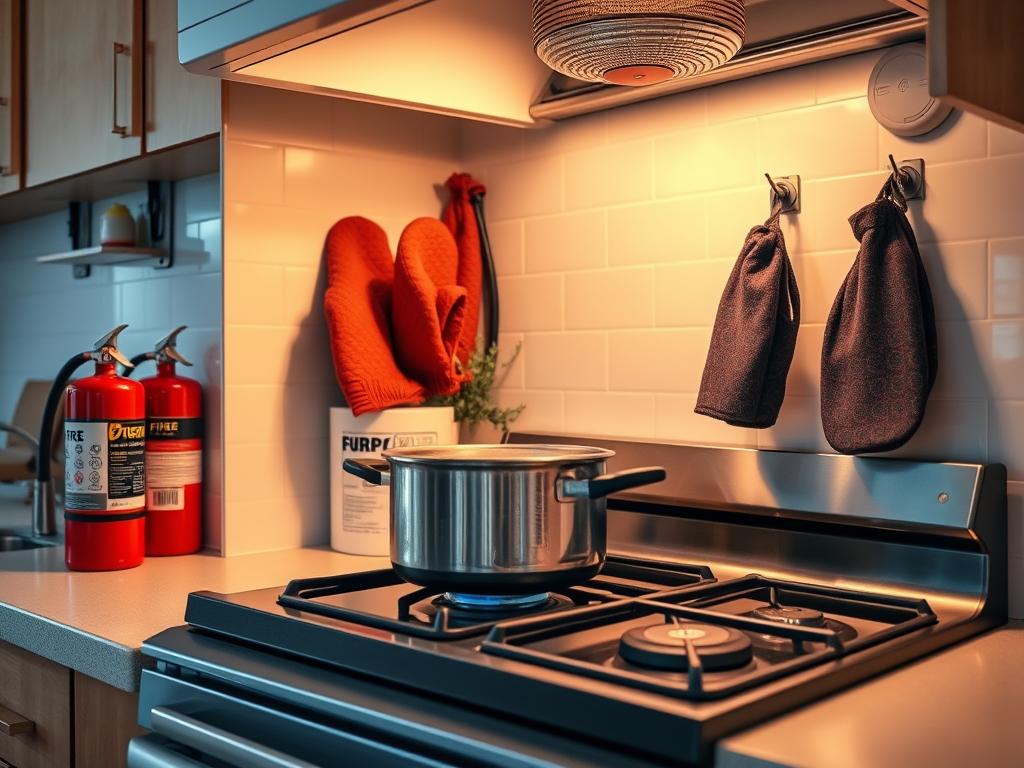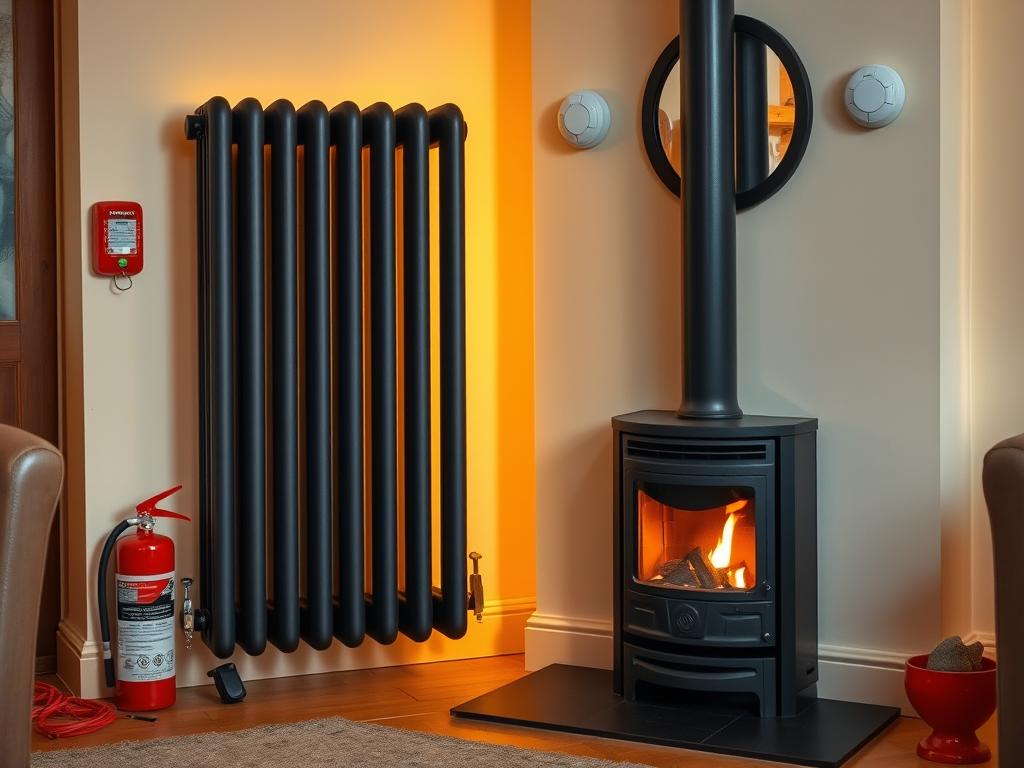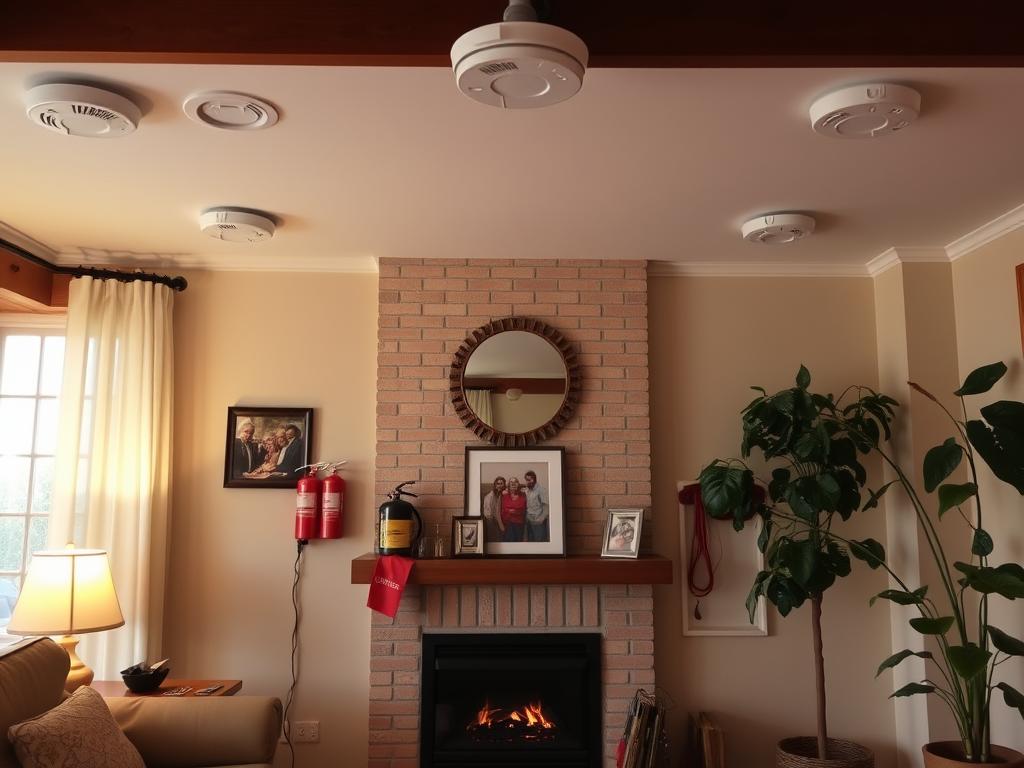Learning how to prevent house fires must be taken very seriously. House fires can cause a lot of damage and even lead to loss of life. But you can lower the risk by taking steps to prevent fires. This guide will share important fire safety tips to protect your home and family.
Key Takeaways
- Regularly test and maintain your smoke alarms to ensure they’re functioning properly.
- Identify and address potential fire hazards in your home, such as faulty wiring or cluttered spaces.
- Practice kitchen safety by closely monitoring cooking activities and properly maintaining appliances.
- Develop a home fire escape plan and practice it with your family to prepare for an emergency.
- Stay vigilant about fire risks and continuously look for ways to enhance your home’s fire safety.
Introduction to House Fire Prevention
Residential fires can cause extensive damage, hurt people, and even cause death. To prevent them, it’s important to know what causes house fires. This section will discuss how to keep your home safe from fires and what steps you can take to lower the risk.
Understanding the Risks and Importance
Many things can start a house fire, like electrical problems, cooking mistakes, heating issues, and using candles or open flames wrong. These residential fire hazards are a big threat to families. By knowing the risks and acting early, homeowners can significantly reduce the chance of a fire.
Fires can spread fast, leaving little time to get out. Quick action and a good plan can save lives. Putting in fire safety measures and having an emergency plan can protect your family and home.
“Fire prevention is not just a matter of safety – it’s a responsibility we all share as homeowners and community members.”
Proactively preventing house fires is key to a safe and peaceful home. By understanding the risks and taking steps to prevent them, homeowners can lower the risk of a big fire and protect what’s most important.
Smoke Alarm Installation and Maintenance
Smoke alarms are key to preventing home fires. They give early warnings, saving lives. Installing and maintaining them well is vital to ensure they work when needed.
Put smoke alarms on every level of your home, including the basement, and near each bedroom door. Don’t put them near windows, doors, or vents, as the air can interfere with their smoke detection.
- Test your smoke alarms every month to check they work right.
- Change the batteries twice a year, like when you change the clocks for daylight saving.
- Clean your smoke alarms often by vacuuming the outside to eliminate dust and debris.
- Replace your smoke alarms every 10 years or as the maker suggests to keep them working well.
Following these easy steps for cleaning your smoke alarm can keep your home and family safe from home fire prevention. A well-kept smoke alarm is crucial in a fire emergency.
How to Prevent House Fires
Identifying and Mitigating Potential Hazards
Preventing house fires means being proactive and tackling potential fire hazards at home. By spotting common risks and fixing them, you can lower the chance of a big fire, making your home safer.
Electrical issues are a big fire risk. Check your home’s wiring, outlets, and appliances often. This helps you find and fix problems early. Don’t overload outlets and watch out for frayed or damaged cords.
Clutter and incorrectly storing flammable items can also be dangerous. Keep newspapers, magazines, and cleaning supplies away from heat. Make sure paths and exits are clear for emergencies.
Heating gear like fireplaces, furnaces, and space heaters need extra care. Keep them in good shape and use them right. Clean and service them often to stop dust and debris from building up.
Being proactive can reduce the risk of house fires and keep your family and stuff safe. Fire prevention is always important. Keep an eye on your home for new risks.
Kitchen Fire Safety Tips
The kitchen is a familiar spot for house fires, often due to cooking and faulty appliances. To keep your home safe, it is vital to follow key kitchen fire prevention steps.
Cooking Precautions and Appliance Care
Being careful while cooking is crucial for kitchen fire safety. Always be in the kitchen when you cook, and never leave the stove alone. Keep things that can catch fire, like towels and oven mitts, away from the stove. Also, check and keep your kitchen appliances in good shape to avoid fires from malfunctions or neglect.
- Stay in the kitchen while cooking to monitor the process.
- Keep flammable items at a safe distance from the stovetop.
- Inspect and maintain kitchen appliances to prevent malfunctions.
Storing flammable items safely in the kitchen is key for kitchen fire prevention and home fire prevention. Don’t keep things that can easily catch fire, like paper or aerosol cans, near heat or open flames.
| Kitchen Fire Prevention Tips | Best Practices |
|---|---|
| Cooking Precautions |
|
| Appliance Maintenance |
|
| Flammable Storage |
|
Following these kitchen fire prevention tips and being careful with cooking and appliances can greatly lower the risk of fires at home.

Electrical Fire Prevention Strategies
Electrical fires are a big threat to home safety. They can start from faulty wiring, overloaded outlets, or wrong use of electrical devices. To lower the risk of electrical fires, it’s key to use prevention strategies and safe electrical habits.
Safe Practices for Outlets and Wiring
Proper use and upkeep of outlets and wiring are crucial for electrical fire prevention. Here are some steps to follow:
- Avoid overloading outlets by limiting the number of devices plugged into one outlet.
- Check electrical cords often and replace any that are frayed, damaged, or worn.
- Ensure all electrical wiring is installed and kept up by a licensed electrician.
- Don’t use extension cords as a permanent fix; consider adding more outlets if needed.
- Unplug appliances and devices when not being used to lower the risk of electrical problems.
Following these safe electrical habits can greatly lower the chance of electrical fire prevention and boost your home fire prevention efforts.
| Electrical Safety Tip | Explanation |
|---|---|
| Avoid Overloading Outlets | Putting too many devices on an outlet can make it overheat and start a fire. Keep the number of devices on each outlet in check. |
| Replace Damaged Cords | Worn or damaged cords can be fire hazards. Check and replace any cords that look bad. |
| Use Extension Cords Properly | Extension cords should only be used temporarily. If you need more outlets, think about adding them. |
“Electrical safety should be a top priority in every home to prevent devastating fires and protect loved ones.”
By using these electrical fire prevention tips and staying alert about electrical safety, you can reduce the risk of fires at home, helping keep your family safe.
Heating System Safety Measures
Keeping your heating systems in good shape is key to preventing house fires. Appliances like furnaces, fireplaces, and space heaters can be risky if not used carefully. Here, we’ll cover essential steps to keep your heating systems safe and reduce fire risks.
Regular Inspection and Maintenance
It is crucial to check and maintain your heating system regularly. A professional should inspect your furnace, fireplace, or other heating gear once a year. They can spot and fix any problems, like worn parts or wrong settings, to ensure your system works well and safely.
Proper Heating System Usage
Always follow the maker’s instructions when using your heating system. Don’t put things like furniture, curtains, or clothes near heat sources because they can burn easily. Also, ensure nothing blocks your heating system’s airflow to prevent overheating.
Fireplace and Chimney Safety
Having a fireplace means you need to clean and check your chimney often. Creosote, a flammable substance from burning wood, can cause chimney fires. Get a professional sweep to clean and check your chimney yearly to keep it safe.
| Heating System Safety Tip | Importance |
|---|---|
| Regular Inspection and Maintenance | Identify and address potential issues before they become hazards |
| Proper Heating System Usage | Prevent fires by keeping combustible materials away from heat sources |
| Fireplace and Chimney Safety | Mitigate the risk of chimney fires and ensure proper ventilation |
These steps can greatly lower the risk of house fires and keep your home and family safe. Being proactive with your heating system’s care and use is the best way to ensure your home stays fire-free.

Candle Fire Safety Guidelines
Candles can make any home warm and welcoming but can also be a fire hazard if not used carefully. To keep your home safe from candle fires, follow some essential guidelines.
Proper Usage and Placement of Candles
Using and placing candles correctly is key to candle fire safety. Always keep candles at least 12 inches away from anything that can catch fire, like curtains, furniture, or decorations. Don’t put candles near open windows or areas where drafts can spread the flame. Also, never leave a candle burning by itself, and make sure to put it out before leaving a room or going to sleep.
- Keep candles at least 12 inches away from anything flammable.
- Avoid placing candles near open windows or drafty areas.
- Never leave a burning candle unattended.
- Extinguish candles before leaving a room or going to bed.
By following these simple rules for candle fire safety and home fire prevention, you can enjoy candles safely, reducing the risk of a big house fire.
“A moment of carelessness with a candle can lead to a lifetime of regret.”
Home Fire Escape Planning
Having a solid emergency plan can save lives in a house fire. It’s key to make and practice a home fire escape plan. This is a vital part of fire safety tips and home fire prevention.
Creating and Practicing an Emergency Plan
To keep your family safe, follow these steps for a home fire escape plan:
- Find exit routes from every room, including windows and doors.
- Choose a meeting spot outside, away from the house.
- Make sure everyone knows the plan and their part in it.
- Practice the plan often so everyone knows what to do fast if there’s a fire.
- Keep escape routes clear of clutter for quick exits.
- Teach kids not to hide from firefighters and to go straight to the meeting spot if there’s a fire.
“Having a well-rehearsed home fire escape plan is crucial for your family’s safety. Regular practice can mean the difference between a tragic outcome and a successful evacuation.”
Creating and practicing a detailed home fire escape plan helps keep your family safe and calm in a fire emergency.
Residential Fire Hazards Awareness
Keeping your home fire-safe is key to protecting your family and property. Knowing about fire risks in homes and how to prevent them is vital. This section will cover common fire risks and how to handle them.
One big cause of home fires is an overloaded electrical system. This happens when outlets are too full, faulty wiring, or old panels. Check your home’s electrical setup often and fix any problems to stop fires.
Clutter and things that can catch fire are also big fire risks. Papers, fabrics, and other flammable items can spread a fire fast. Keep your home clean and put flammable stuff away from heat sources safely.
- Look for and fix any overloaded outlets or old wiring in your home.
- Keep your home tidy by removing clutter and storing flammable items safely.
- Check for and fix any fire hazards, like broken appliances or heating systems.
| Residential Fire Hazard | Description | Mitigation Strategies |
|---|---|---|
| Overloaded Electrical System | Old wiring, bad outlets, and too many things on a circuit can lead to electrical fires. | Check your electrical setup often, update to newer standards, and don’t overload outlets. |
| Combustible Materials Storage | Storing things like papers, fabrics, and chemicals wrong can spread a fire. | Declutter often, keep flammable items away from heat, and eliminate dangerous stuff. |
| Malfunctioning Appliances | Appliances that don’t work right or are not taken care of can be a big fire risk. | Keep all appliances in good shape, and replace any broken or old ones. |
By tackling these common fire hazards, you can lower the risk of a big house fire, keeping your family safe. Remember, being proactive is the best way to ensure your home is fire-safe.
Fire Risk Reduction through Home Maintenance
Keeping your home in top shape is key to lowering fire risks. Regular checks and early action can help keep your home safe from fires. Attention to electrical systems and heating gear is crucial for fire risk reduction and home fire prevention.
Keeping Your Home Fire-Safe
To keep your home fire-resistant, follow these essential steps:
- Check and fix electrical wiring, outlets, and appliances to stop electrical fires.
- Clean and maintain your heating systems, such as furnaces and chimneys, to prevent flammable materials from building up.
- Store and remove flammable liquids and chemicals safely to reduce fire risks.
- Ensure smoke alarms work by testing them monthly and changing the batteries every six months.
- Clear out clutter and remove things that could catch fire, like old newspapers and unused items.
By being careful and taking steps to keep your home in good shape, you can significantly lower the chance of fire risk reduction and home fire prevention. A well-kept home is a safer home.
Conclusion
You need a full plan to keep your home safe from fires. This article has given you key safety tips and ways to prevent fires. These steps can greatly lower the risks and keep your family and things safe.
It’s essential to have working smoke alarms and fix any fire hazards you find. Make sure your kitchen, electrical systems, and heaters are safe. Also, follow candle safety rules and have a plan for escaping in an emergency. These steps are key to preventing house fires.
Fire safety tips are not just for now but require ongoing effort. Always be alert and check your fire safety plans often. Act quickly to fix any risks you see. This way, you can ensure your loved ones feel safe at home, away from the dangers of fires.
